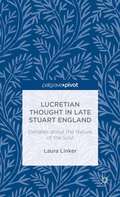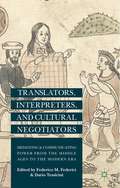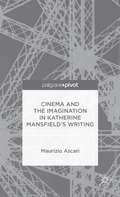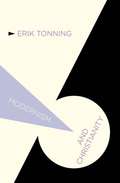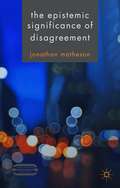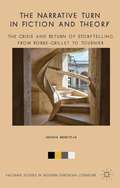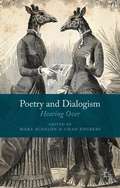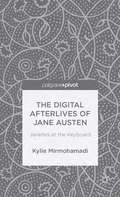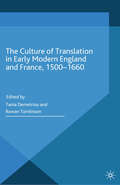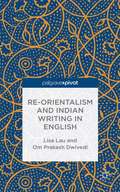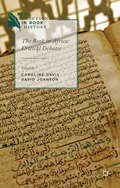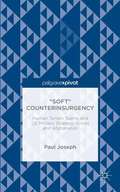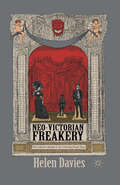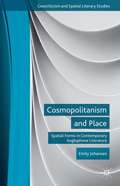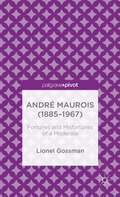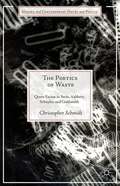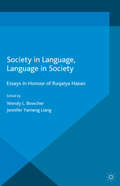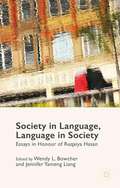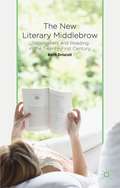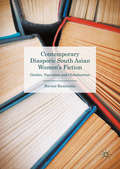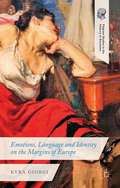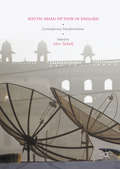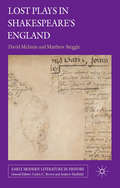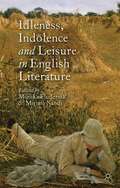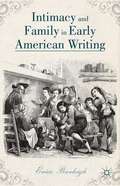- Table View
- List View
Lucretian Thought in Late Stuart England: Debates about the Nature of the Soul
by Laura LinkerHow did writers understand the soul in late seventeenth-century England? This book considers depictions of the soul in literary texts that engage with Lucretius's Epicurean philosophy in De rerum natura or through the writings of the most important natural philosopher to disseminate Epicurean atomism in England, Walter Charleton (1619-1707).
Translators, Interpreters, and Cultural Negotiators
by Federico M. Federici Dario TessiciniThis book reconsiders the intellectual, social and professional identity of translators and interpreters when their role involves an intercultural negotiation with institutional powers, be them medieval rulers, modern States, an army of invasion or a dominant culture. Surprisingly little is known of how historical mediations took place, how the mediators worked, and the ways in which transcultural mediations become implicit or explicit forms of power. The chapters seek to address how translators and interpreters can emerge in a position of power by presenting visions, methods, and case studies dealing with a wide thematic range of issues, such as historical concerns, cultural identity, and the role of translation in mediation and cultural transfer. With far-reaching analysis of history, politics, religion and literature, this book will appeal to researchers and students of translation, the history of communication, and institutional power.
Cinema and the Imagination in Katherine Mansfield’s Writing
by Teresa A. FisherUsing silent cinema as a critical lens enables us to reassess Katherine Mansfield's entire literary career. Starting from the awareness that innovation in literature is often the outcome of hybridisation, this book discusses not only a single case study, but also the intermedia exchanges in which literary modernism at large is rooted.
Modernism and Christianity
by Erik TonningBy theorising the idea of 'formative tensions' between cultural Modernism and Christianity, and by in-depth case studies of James Joyce, David Jones, T. S. Eliot, Ezra Pound, W. H. Auden, Samuel Beckett, the book argues that no coherent account of Modernism can ignore the continuing impact of Christianity.
The Epistemic Significance of Disagreement
by Jonathan MathesonDiscovering someone disagrees with you is a common occurrence. The question of epistemic significance of disagreement concerns how discovering that another disagrees with you affects the rationality of your beliefs on that topic. This book examines the answers that have been proposed to this question, and presents and defends its own answer.
The Narrative Turn in Fiction and Theory
by Hanna MeretojaThe Narrative Turn in Fiction and Theory explores the philosophical and historical underpinnings of the postwar crisis and return of storytelling and shows their relevance for the ongoing debate on the significance of narrative for human existence.
Poetry and Dialogism
by Mara Scanlon Chad EngbersThese essays extend an ongoing conversation on dialogic qualities of poetry by positing various foundations, practices, and purposes of poetic dialogism. The authors enrich and diversify the theoretical discourse on dialogic poetry and connect it to fertile critical fields like ethnic studies, translation studies, and ethics and literature.
The Digital Afterlives of Jane Austen: Janeites at the Keyboard
by Kylie MirmohamadiThis is the first scholarly study to explore the ever-expanding world of online Austen fandom and fan fiction writing. Using case studies from the Internet writing community and publisher, Wattpad, as well as dedicated fan websites, it illuminates the literary processes and products that have given Austen multiple afterlives in the digital arena.
The Culture of Translation in Early Modern England and France, 1500–1660
by Tania Demetriou Rowan TomlinsonThis book explores modalities and cultural interventions of translation in the early modern period, focusing on the shared parameters of these two translation cultures. Translation emerges as a powerful tool for thinking about community and citizenship, literary tradition and the classical past, certitude and doubt, language and the imagination.
Re-Orientalism and Indian Writing in English
by Lisa Lau Om Prakash DwivediAt its most basic, re-Orientalism is defined as forms of Orientalism practiced and manifested by Orientals in representing the Orient. This book looks at the application and discourse of re-Orientalism in contemporary Indian and South Asian writing in English, particularly social realism fiction.
The Book in Africa
by Caroline Davis David JohnsonThis volume presents new research and critical debates in African book history, and brings together a range of disciplinary perspectives by leading scholars in the subject. It includes case studies from across Africa, ranging from third-century manuscript traditions to twenty-first century internet communications.
"Soft" Counterinsurgency: Human Terrain Teams and US Military Strategy in Iraq and Afghanistan
by Paul JosephSoft Counterinsurgency reviews the promises and achievements of Human Terrain Teams, the small groups of social scientists that were eventually embedded in every combat brigade in Iraq and Afghanistan.
Neo-Victorian Freakery: The Cultural Afterlife of the Victorian Freak Show
by Helen DaviesNeo-Victorian Freakery explores the way in which contemporary fiction, film, and television has revisited the lives of nineteenth-century freak show performers. It locates the neo-Victorian freak show as a crucial forum for debating the politics of disability, gender, sexuality and race within the genre more broadly.
Cosmopolitanism and Place
by Emily JohansenCosmopolitanism and Place considers the way contemporary Anglophone fiction connects global identities with the experience in local places. Looking at fiction set in metropolises, regional cities, and rural communities, this book argues that the everyday experience of these places produces forms of wide connections that emphasize social justice.
André Maurois (1885–1967): Fortunes and Misfortunes of a Moderate
by Lionel GossmanRespected by his peers and hugely successful internationally in his own time, Andre Maurois is now hardly read. Moderate and conciliatory in everything, including his literary style, he appealed to the educated reader of his time, but did those very qualities prevent him from achieving lasting distinction and impact?
The Poetics of Waste
by Christopher SchmidtModernist debates about waste - both aesthetic and economic - often express biases against gender and sexual errancy. The Poetics of Waste looks at writers and artists who resist this ideology and respond by developing an excessive poetics.
Society in Language, Language in Society: Essays in Honour of Ruqaiya Hasan
by Wendy L. Bowcher Jennifer Yameng LiangThis collection of original articles covers a range of research connecting with the work of the eminent linguist Ruqaiya Hasan. It contains contributions from M.A.K. Halliday, G. Williams, D. Butt, D. Miller and M. Berry among others, an interview with Ruqaiya Hasan, and notes from the contributors about their connection with Ruqaiya Hasan's work.
Society in Language, Language in Society: Essays in Honour of Ruqaiya Hasan
by Wendy L. Bowcher Jennifer Yameng LiangThis collection of original articles covers a range of research connecting with the work of the eminent linguist Ruqaiya Hasan. It contains contributions from M.A.K. Halliday, G. Williams, D. Butt, D. Miller and M. Berry among others, an interview with Ruqaiya Hasan, and notes from the contributors about their connection with Ruqaiya Hasan's work.
The New Literary Middlebrow
by Beth DriscollThe middlebrow is a dominant cultural force in the twenty-first century. This book defines the new literary middlebrow through eight key features: middle class, feminized, reverential, commercial, emotional, recreational, earnest and mediated. Case studies include Oprah's Book Club, the Man Booker Prize and the Harry Potter phenomenon.
Contemporary Diasporic South Asian Women's Fiction: Gender, Narration and Globalisation
by Ruvani RanasinhaThis book is the first comparative analysis of a new generation of diasporic Anglophone South Asian women novelists including Kiran Desai, Tahmima Anam, Monica Ali, Kamila Shamsie and Jhumpa Lahiri from a feminist perspective. It charts the significant changes these writers have produced in postcolonial and contemporary women's fiction since the late 1990s. Paying careful attention to the authors' distinct subcontinental backgrounds of Pakistan, Bangladesh and Sri Lanka - as well as India - this study destabilises the central place given to fiction focused on India. It broadens the customary focus on diasporic writers' metropolitan contexts, illuminates how these transnational, female-authored literary texts challenge national assumptions and considers the ways in which this new configuration of transnational, feminist writers produces a postcolonial feminist discourse, which differs from Anglo-American feminism.
Emotions, Language and Identity on the Margins of Europe
by Kyra GiorgiWhen a word describing an emotion is said to be untranslatable, is that emotion untranslatable also? This unique study focuses on three word-concepts on the periphery of Europe, providing a wide-ranging survey of national identity and cultural essentialism, nostalgia, melancholy and fatalism, the production of memory and the politics of hope.
South-Asian Fiction in English
by Alex TickellThis collection offers an essential, structured survey of contemporary fictions of South Asia in English, and includes specially commissioned chapters on each of the national traditions of the region. It covers less well known writings from Pakistan, Sri Lanka and Bangladesh as well as the more firmly established canon of contemporary Indian literature, and features chapters on important new and emergent forms such as the graphic novel, genre fiction and the short story. It also contextualizes some key 'transformative' aspects of recent fiction such as border and diaspora identities; new middle-class narratives and popular genres; and literary response to terror and conflict. Edited and designed with researchers and students in mind, the book updates existing criticism and represents a readable guide to a dynamic, rapidly changing area of global literature.
Lost Plays in Shakespeare’s England
by David Mcinnis Matthew SteggleLost Plays in Shakespeare's England examines assumptions about what a lost play is and how it can be talked about; how lost plays can be reconstructed, particularly when they use narratives already familiar to playgoers; and how lost plays can force us to reassess extant plays, particularly through ideas of repertory studies.
Idleness, Indolence and Leisure in English Literature
by Monika Fludernik Miriam Nandi'Trouble springs from idleness, and grievous toil from needless ease' (Benjamin Franklin). Such negative evaluations of idleness and their contrary, positive reevaluations, as in Cyril Connolly's 'Idleness is only a coarse name for my infinite capacity for living in the present', have been common attitudes towards leisurely disporting and idle repose. This collection of essays traces the history of representations of idleness, indolence and leisure in English literature from the late Middle Ages to the present day. It focuses on issues as varied as the figure of the idle apprentice in the Elizabethan pamphlet wars, the 'lazy native' in British colonial discourse, positive re-evaluations of indolence and repose in the Romantic era and the delights of tramping in early twentieth-century prose. The contributions also significantly inflect current theoretical debates on race, class and gender. The topicality of the subject is emphasized by two pieces of sociological analysis which serve as epilogues to the volume.
Intimacy and Family in Early American Writing
by Erica BurleighThrough the prism of intimacy, Burleigh sheds light on eighteenth and early-nineteenth-century American texts. This insightful study shows how the trope of the family recurred to produce contradictory images - both intimately familiar and frighteningly alienating - through which Americans responded to upheavals in their cultural landscape.
